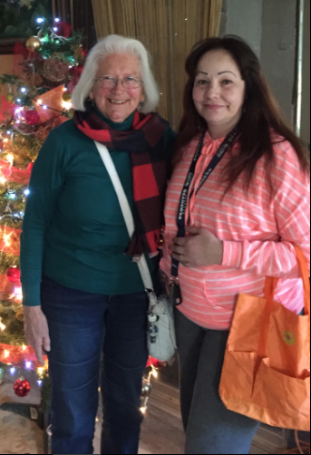The following is a reflection by Liz Hadley, World Relief Employment Specialist. Names have been changed for privacy.
I brought a handful of daffodils to dinner–ones I had picked from the side of the rode en route to the apartment. I wanted to bring something to celebrate.
I knocked on the door, offered my handful of flowers and a hug to my friend, and then watched as her youngest child teetered around the living room. “She’s walking now!” I thought. The first time I had heard about this little one, she was mere months old, in hiding, and living far from her mom.
Our dinner tonight is a birthday dinner of sorts. Sayida calls this day her “new birthday”: it’s the day she was granted asylum and her life started over.
A year ago, I remember seeing her in our office for the first time. I had heard of a female asylee from Afghanistan being released from the Immigration Detention Center in Tacoma…and then I met her in front of the copier and fax machine. She was strong and relieved, but also anxious.
I remember holding in my hands the threatening letters from the Taliban that were posted on Sayida’s door back home. I remember her telling me that while in detention, she prepared her own asylum case by telling her story to an Iranian woman who translated it into English for a Congolese woman who then wrote it down in English. All three of them were awaiting their court hearing, all three of them believing in one another. I remember crying with her as she told me how old her children were, how they had to split the children up for safety, and how the youngest one should still have been nursing. I remember I couldn’t tell her if or when her family would be able to come.
Today I sit at their American-style dinner table and smile at how her husband, Mustafa, is patiently feeding the little one and leaning over to laugh and ask Sayida (again) what I’ve just said. And I’m in love with the joy and positivity of their journey. When I took her to her first job interview, she explained to the manager that she was an engineer in Afghanistan and had worked on water projects to help women in her country grow vegetables. I was so proud of how she communicated her own strength and story.
I remember bringing her a roll of bread while she worked her way through the company’s AutoCAD interview test…she hadn’t eaten all day but was intent on showing the company what skills she had to offer. And this interview turned into an internship, and the internship turned into a job, and now everyday she carpools with two other Afghans to work with the engineering team.
In the Fall I remember meeting her for coffee near her workplace and asking about an update…any news on her family? Nothing yet.
And I remember the text I received 2 months ago that read “I have good news. My family visas issued” and then a week later a picture of all of them together at the airport.
I met her at our office by the copier and fax machine again, but this time everything was different. Her 1 year old in her arms and the older two in tow, she introduced me to Mustafa: the man who had supported her engineering work all along, who had phoned her to tell her it wasn’t safe to come back to Afghanistan, who had cared for their children while she sought asylum, and who had waited nearly a year to be all together in safety.

And now at dinner Mustafa pulls out a stack of old photos for me to riffle through–small memories of their life before–he practices the little English he knows, and laughs with his children who are all learning to be siblings again. He cares for the two youngest while Sayida goes to work during the week and he’s prepared us dinner tonight. When I ask him how things are, he tells me “America is good!” with a laugh and a smile.
We talk about how much a year has held – how much has happened to their family.
Today marks a year of freedom for Sayida, but only a mere 2 months for her family. “But everything is good, thanks God” she tells me as she pours tea and reminds me that I can sleep on the couch tonight since Seattle is so far away.
I decline the couch surfing option but take the tea, and thank God also for the strength and joy this family has given me.
Join us in Empowering Women like Sayida

